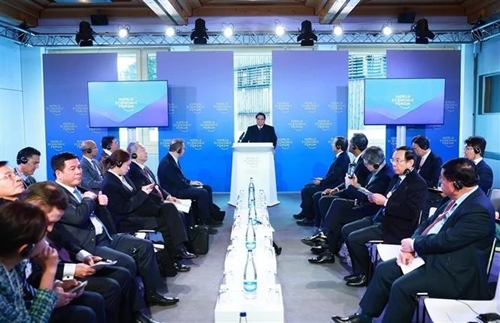The dialogue saw the participation of the WEF's Head of Regional Agenda for Asia-Pacific Joo-Ok Lee, along with more than 60 global business leaders who are members of the WEF. This is one of the few country dialogues held at WEF Davos 55 and is the fourth event of this kind that the WEF has organized with Vietnam.
The Vietnamese Government leader thanked the participation of representatives from numerous international partners and businesses, saying that this helps spread the spirit of international cooperation and highlights the role of public-private partnerships in driving global development and prosperity.
    |
 |
|
Prime Minister Pham Minh Chinh speaks at the country strategic dialogue within the framework of the 55th Annual Meeting of the World Economic Forum (WEF) in Davos, Switzerland, on January 21. |
Analyzing Vietnam's growth potential, Prime Minister Pham Minh Chinh highlighted the economy's resilience, stating that despite having to overcome challenges due to its ongoing economic transition, modest economic scale, and high openness, and dealing with natural disasters and climate change impacts, exemplified by the devastating Typhoon Yagi, which severely affected 26 out of 63 cities and provinces, causing losses that lowered the GDP growth rate by approximately 0.15-0.2% in 2024, the country has still achieved and exceeded all 15 socio-economic development targets.
To unleash its growth potential and meet strategic goals by 2030 and 2045, Vietnam is focusing on revitalizing traditional growth drivers such as investment, exports, and consumption, while concentrating new growth engines, including digital economy, green economy, circular economy, sharing economy, knowledge-based economy, and creative economy, the Prime Minister said, adding that Vietnam considers science, technology, innovation, and digital transformation new drivers for development.
Vietnam continues to prioritize growth while maintaining macroeconomic stability, controlling inflation, and ensuring the major balances of the economy, aiming to achieve a at-least-8% growth rate in 2025, a double-digit growth in the following years, ready to step into a new era – the era of the nation’s rise towards prosperity and civilization with people increasingly enjoying well-being and happiness, he said.
The country is concentrating on implementing three strategic breakthroughs —institutions, infrastructure, and human resources, with perfecting the institutional framework is considered as the "breakthrough of breakthroughs,” involving reducing administrative procedures, streamlining apparatus, treating institutions as a resource and driver, which help cut down the time and costs for businesses and citizens, freeing up resources, and using public investment as a catalyst to drive further investment.
It is making breakthroughs in building comprehensive and modern infrastructure, encompassing both hard and soft infrastructure, Prime Minister Pham Minh Chinh said, noting that infrastructure for transport, energy development, healthcare, education, sports; digital infrastructure; and climate resilience infrastructure, contribute to reducing logistics costs and improving the competitiveness of goods and products.
Vietnam has the foundation to achieve the set goals, increasingly gaining more experience, greater confidence, resilience, and more resources to continue its development in the new era, he stressed.
He also revealed the development of key infrastructure projects, saying that Vietnam plans to complete its North-South high-speed railway within about 10 years; begin the construction of a railway connecting with China, Central Asia, and Europe in 2025; and fulfil a nuclear power plant within five years.
Many airport, seaport, and expressway projects are being strongly pushed to meet deadlines, striving to complete at least 3,000 km of expressways by 2025 he said.
Special attention has been paid to training high-quality human resources, especially for emerging industries in the digital age, such as semiconductors, artificial intelligence, cloud computing, IoT, and photonics, to meet the demand of businesses and investors; and improve labor productivity, he went on.
Vietnam has determined to pursue rapid yet sustainable development, with people placed at the center, and not sacrifice progress, social equity, and environmental protection in pursuit of mere economic growth, he said, adding that the country has also pioneered in completing the U.N. millennium development goals early.
In response to questions of delegates, Prime Minister Pham Minh Chinh stated that Vietnam has launched a program to train 50,000 semiconductor engineers, and it has also committed to ensuring a stable supply of electricity through comprehensive solutions, including developing wind power, solar power, nuclear energy, and importing electricity.
Regarding the real estate market, he provided updates on Vietnam's ongoing efforts to refine the legal framework and policies related to real estate, and strategic infrastructure development to create new spaces for growth.
He urged partners and investors to continue collaborating with Vietnam in priority areas, including providing feedback on institutional development, attracting high-quality investments, building infrastructure, offering financial incentives, conducting research and transferring modern technologies, as well as training and attracting skilled human resources, and improving modern governance capabilities.
Delegates expressed their impression of the Vietnamese government's determination and commitment to improving investment environment; and valued the attractive investment opportunities in the Southeast Asian nation, while appreciating the attention and strong support extended to the business community.
They wished to explore Vietnam’s mechanisms and policies that encourage investors to participate in fields such as infrastructure, liquefied natural gas, healthcare, oil and gas industries, and hospitality.
They said that they seek clear policies to ensure electricity supply, streamlined procedures for project implementation, access to skilled laborers, and solutions to overcome export restrictions in key markets of Vietnam.
Delegates showed high expectations for a new era of Vietnam, characterized by significant advancements in both quality and quantity of its economy, saying that they will partner with Vietnam in the coming time and expand investment and business activities in Vietnam as a long-term development strategy for their companies.
Source: VNA